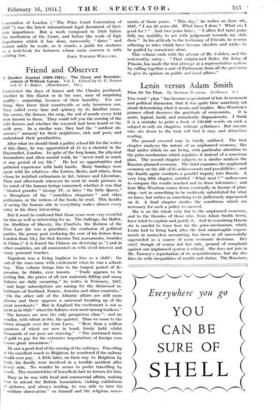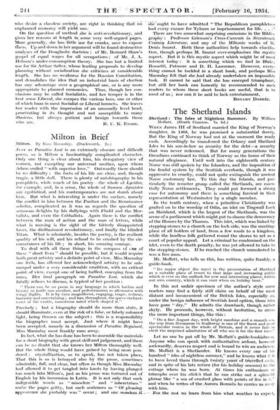Lenin versus Adam Smith
Plan Or No Plan. By Barbara Wootton. (Gollanez. 55.) TuE word" plan " has become so persistent of late in economic and political discussion, that it was quite time somebody set about determining what it means and implies. Miss Wootton's
pioneer effort deserves the gratitude of economists. It is acute, logical, lucid, and remarkably dispassionate. I think it is a mistake to print a book of 130,000 words on such a subject in only six chapters, without syllabuses. But anyone who sits down to the task will find it easy and attractive reading.
The ground covered may be briefly outlined. The first chapter analyses the nature of an unplanned economy, like that under which we are living, with particular attention to the price-mechanism which regulates it instead of a conscious plan. The second chapter subjects to a similar analysis the Russian planned economy. The third examines the unplanned economy on the side of its achievements and possibilities ; and the fourth again conducts a parallel inquiry into Russia. A very long fifth chapter, entitled "What next ? " endeavours to compare the results reached and to draw inferences ; and here Miss Wootton comes down eventually in favour of plan- ning—not as something to be recklessly substituted for what we have, but rather as something to be judiciously superposed on it. A final chapter studies the conditions which are necessary for such a policy to succeed.
She is on the whole very fair to the unplanned economy, and to the theories of those who, from Adam Smith down, have tried to explain and justify it. And in examining Russia she is careful to trace how far the price-mechanism, which Lenin had to bring back after the first catastrophic experi- ments in moneyless accounting, has been at all successfully superseded as a source of main economic decisions. Her chief, though of course not her only, ground of complaint against our unplanned system is ethical. She does not join in Mr. Tawney's reprobation of its acquisitiveness, but she dis- likes its wide inequalities of wealth and status. The Russians, who desire a classless society, arc right in thinkinci thilf unplanned economy will yield one.
On the question of method she is anti-revolutionary, and gives her reasons at length in some very well-argued pages. More generally, she has little Use for cranks, save to expose -Chem. Up and do-Wit in her argument will be found destructive analyses of the Douglasite doctrine .; of Mr. Bernard Shaw's gospel of equal wages for all occupations ; of Mr. J. A. Hobson's under-consumption theory. She has but a limited use for Sir Arthur Salter, whose leading proposals to develop planning without socialization she criticizes at considerable length. She has no weakness for the Russian Constitution, and demolishes the idea that an industrial basis of election has any advantage over a geographical one, or is any more appropriate to planned economies. Thus, though her con- clusions may be called Socialistic, and her temper is in the best sense Liberal, She escapes the various bees, one or other of which buzz in most Socialist or Liberal bonnets. She leaves her reader with the impression of an unusually level head, penetrating in its thought and not susceptible to many illusions, but always patient and benign towards those









































 Previous page
Previous page